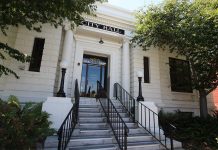Even though questions first arose after the most recent election
regarding improperly returned absentee ballots, records show that
residents who are ineligible by state law to return ballots for
other voters have done so since at least 2000.
Even though questions first arose after the most recent election regarding improperly returned absentee ballots, records show that residents who are ineligible by state law to return ballots for other voters have done so since at least 2000.
Documents obtained by the Free Lance show there were at least 27 improperly returned ballots in November of 2000. Prior to that election, the San Benito County Elections Office began requiring that residents who return other voters’ absentees sign a log book.
Elections officials could not retrieve the log books from the 2002 primary and general elections by press time. But the office’s practice of accepting ballots did not change between 2000 and 2004.
“And our office has not done anything different than we have in the last 20 years,” said head elections official John Hodges.
There’s an investigation into at least 22 absentee ballots returned to the Elections Office in the 2004 primary. District Attorney John Sarsfield hired an inspector from Santa Cruz for the task.
The issue arose after Jaime De La Cruz unofficially defeated incumbent Bob Cruz by 10 votes in the District 5 supervisor race three weeks ago.
Absent voters are allowed to designate a family or household member to return ballots to the Elections Office. The problem – at least eight ballots in District 5 and 22 ballots throughout all five districts were returned by friends or others not allowed to by state law, according to the log book.
The log book requires the name of the absent voter and the name of the person returning the ballot – along with his or her signature and relationship to the voter.
Officials close to the issue say the controversy only recently sprouted because of the close nature of the District 5 race.
“When you have a close election, both candidates are grasping for straws in their favor,” said Hodges, whose office is the focus of the investigation. “And I don’t blame them. I’d do the same.”
Nancy Miller is the lawyer hired by the Board to commission the investigation into the latest election.
The difference in 2004 than past elections, she also said, is the tightness of the District 5 race – along with District 1 where eight votes separate an outright primary win for Don Marcus and a runoff between Marcus and Marci Huston in November.
“This kind of issue pops up, typically, in close races,” Miller said.
Among Board and Hollister City Council races in 2000 and 2002, none were close enough for a couple dozen or so improperly returned ballots to make a difference.
But a San Juan Bautista City Council race was decided by three votes in the November 2000 election.
With two seats open on the Council, Chuck Geiger lost out to Larry Cain and George Rowe. Though Geiger won a seat on the Council in the subsequent 2002 election, and Cain is no longer on the Council – he has been the San Juan city manager since early 2001.
Also, a school board race in the Southside School District was decided by five votes in 2000, according to records. Then District Attorney Harry Damkar placed third in that race in which two seats were open.
Incidentally, Damkar, now a private attorney, is representing Bob Cruz’s wife, Marian, who filed a lawsuit Friday to halt Hodges’ certification of the election.
According to the records from 2000, it turns out Sheriff Curtis Hill returned one of the 27 improper ballots. He returned it for someone and signed the log book as a “fellow employee” of that voter. Hill’s seat, however, was not up for re-election that year.
At the heart of the absentee ballot controversy in 2004 is De La Cruz’s campaign volunteer, Ignacio Velazquez. He returned three ballots in District 5 for friends but said he followed advice of elections officials.
Velazquez attributed the office’s allowance of improperly returned ballots to the small town environment of San Benito County.
“You help your friends. You help your neighbors. And you bring them over – it’s not a big deal,” Velazquez said. He called the investigation and speculative mood surrounding the issue, “beyond petty.”
Hodges said he believes the votes should be validated as long as the envelopes were sealed, which they were. “We lean toward the voter,” he said.
And he only recently realized, he said, a log book in the office is not required by law.
When told of Hodges’ realization, Miller said she couldn’t recall other counties not carrying some sort of log book for returned absentees.
Some do, though, according to Hodges. He pointed out that Shasta County doesn’t maintain a log book, which was confirmed by Shasta County elections personnel.
Madera County registrar of voters, Rebecca Martinez, said she knows of “a couple” of counties that don’t require a log book. She also pointed out that there’s no requirement for designees to show identification. “You can say you’re anyone,” she said.
In the future, whether Hodges plans to reform the system, he paused, and replied, “We haven’t figured that out.”
Though he did suggest the U.S. Post Office move a mailbox near the courthouse – currently about 100 feet away – to directly underneath the Elections Office. Residents dropping the ballots there, he said, would alleviate similar headaches in the future.









